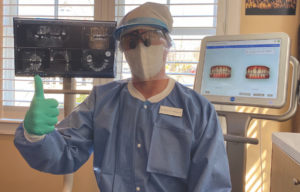Dentistry is one of the most high-risk professions when it comes to disease exposure, but Outer Cape dentists are still finding emergency work to sink their teeth into.

Dr. Scott Allegretti of Provincetown Dental Arts is taking patients with dental emergencies on Tuesday mornings, and he does phone consultations for nonemergency cases.
“Somebody needs to help people,” Allegretti said. “Somebody has to do this.”
But dental work in a pandemic is scary. All dentists are nervous about their exposure.
A dentist’s drill sprays large amounts of water and creates a “giant plume of mist that contains whatever is in the patient’s mouth,” said Dr. Justin Ruffner of Wellfleet’s Outer Cape Dental Group by email.
Outer Cape Dental reported having seen about a dozen people since closing down on March 17.
“We all have families and loved ones that we could potentially bring that home to,” Ruffner wrote. “We just have to do everything that we can to prevent that.”
Currently, that means employing N95 masks, full-face shields, full-length gowns, and surgical caps, he said.
“The main goal is to keep anyone with a dental problem from needing to go to an emergency room or urgent-care facility,” Ruffner said. “Mostly, we have been trying to utilize antibiotics to buy us time until we can see them in the office for definitive treatment.”
Allegretti said he has treated about 12 emergency cases since his office closed on March 19 and has referred many more patients to other practitioners if they can provide care sooner.
When he is away from the dentist’s chair, he jawbones with patients by phone.
“A lot of it is calling people back when they have questions, or they can’t get in touch with their health-care provider,” Allegretti said. “Talking to somebody on the phone makes a huge difference.”
Patients and dentists alike are coping with uncertainty. They want to know when dentistry will return to normal.
Allegretti explained that many dental issues, like a small cavity, may not be urgent right now, but can develop into a severe complication.
“ ‘Emergency’ is very subjective,” he said.
Over the phone, Allegretti will ask patients if their dental problem is causing swelling, bleeding, keeping them up at night, or preventing them from eating.
Based on this information, he will decide what the patient needs, whether it be medication or an in-person visit.
If Allegretti does need to see a patient in his chair, he takes every precaution that he can.
“If a patient is going to come in, I ask for their age and their health history, if they have traveled in the last four weeks, and if they have a fever or a cough,” he said.
His office has also taken extensive measures to protect workers.
“We use the next level of personal protective equipment,” Allegretti said. “We are wearing more state-of-the-art equipment than is necessary to protect us from coronavirus.”
His office has full-face shields and surgical caps and booties, on top of the usual disposable protective scrubs and fluid-resistant gowns.
He has participated in several of dentistry web seminars and conventions aiming to set new standards for personal protection regulations during the Covid-19 outbreak. According to Allegretti, many of these new standards are not formally in place, and so he feels he has to make sure he does his best to protect himself and those who work for him.



